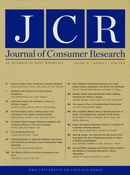-
Views
-
Cite
Cite
Ernest Baskin, Cheryl J. Wakslak, Yaacov Trope, Nathan Novemsky, Why Feasibility Matters More to Gift Receivers than to Givers: A Construal-Level Approach to Gift Giving, Journal of Consumer Research, Volume 41, Issue 1, 1 June 2014, Pages 169–182, https://doi.org/10.1086/675737
Close - Share Icon Share
Abstract
This article looks at the trade-offs that gift givers and gift receivers make between desirability and feasibility using construal level theory as a framework. Focusing on the asymmetric distance from a gift that exists within giver-receiver dyads, the authors propose that, unlike receivers, givers construe gifts abstractly and therefore weight desirability attributes more than feasibility attributes. Support for this proposition emerges in studies examining giver and receiver mind-sets, as well as giver and receiver evaluations of gifts. Furthermore, givers do not choose gifts that maximize receiver happiness or other relationship goals even though givers believe they are doing so. Finally, the authors demonstrate that while givers are sensitive to their distance from the receiver, receivers are not sensitive to this distance.



